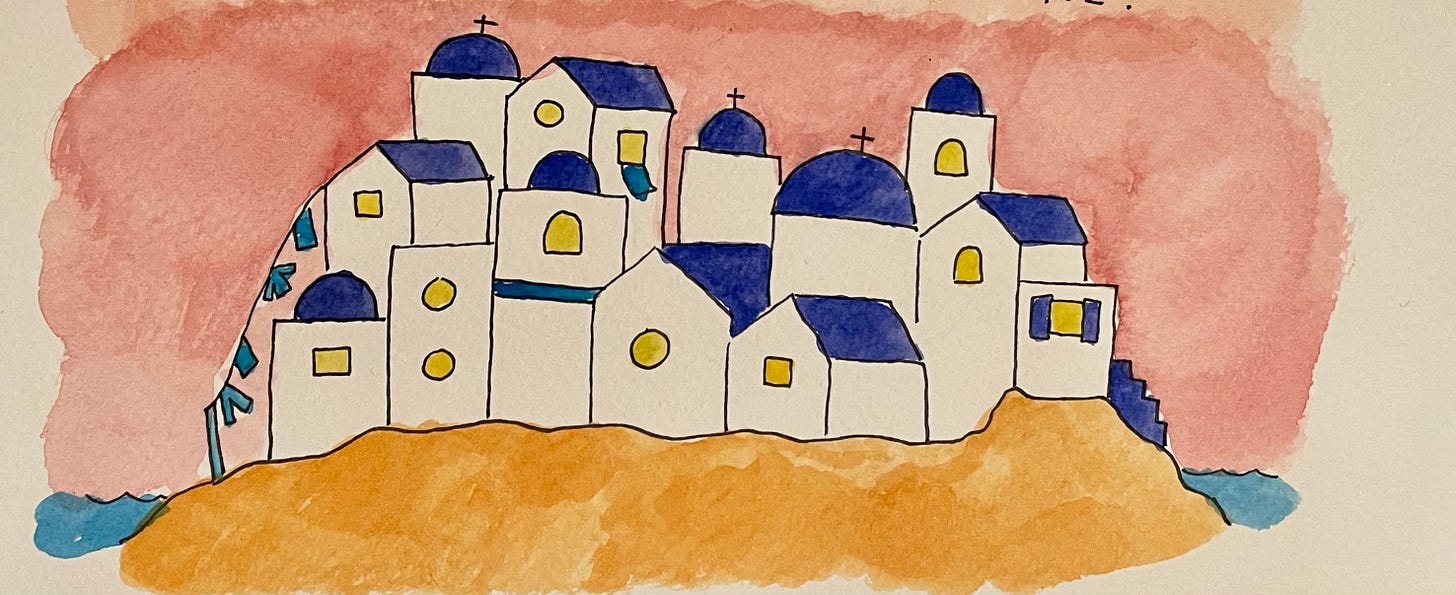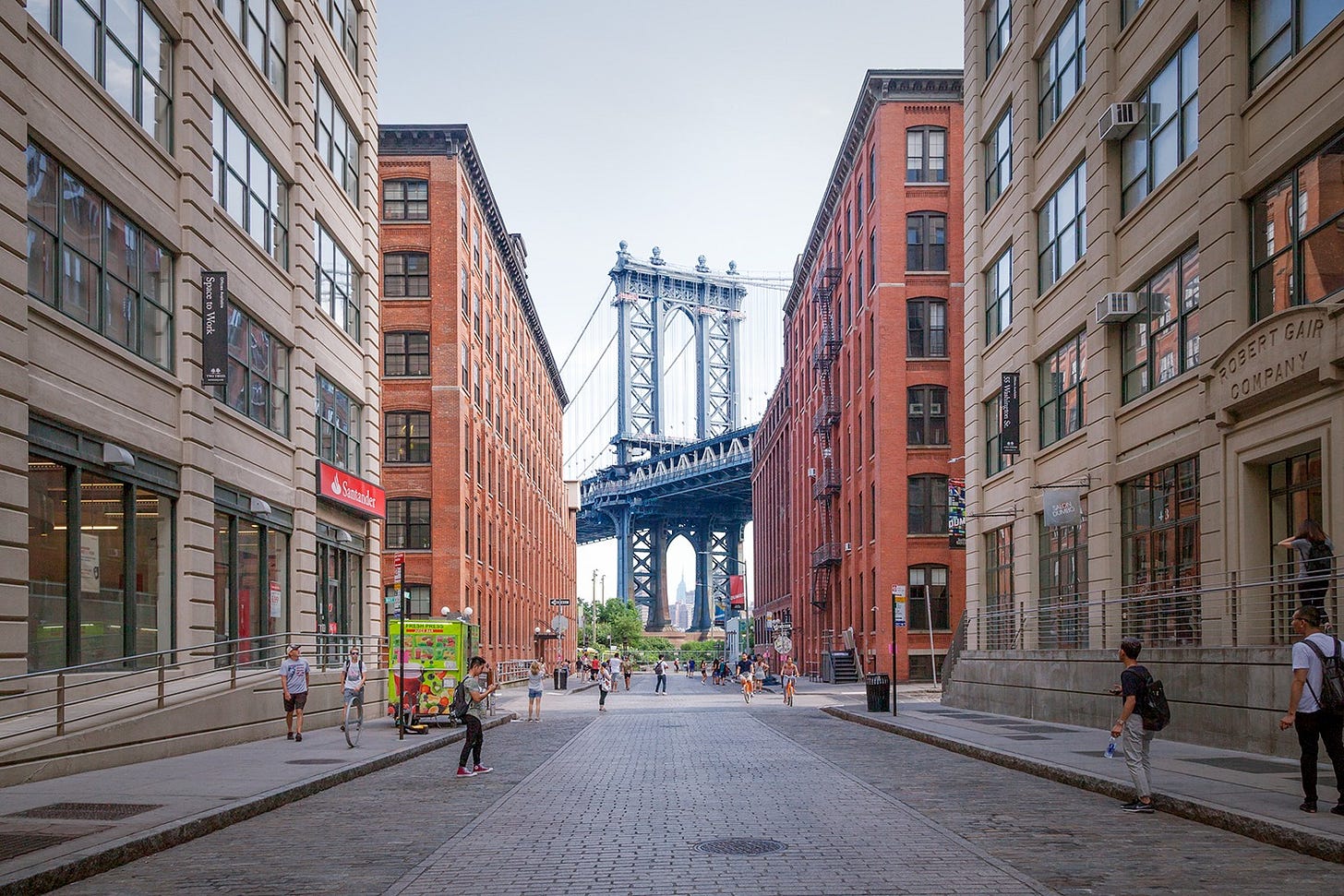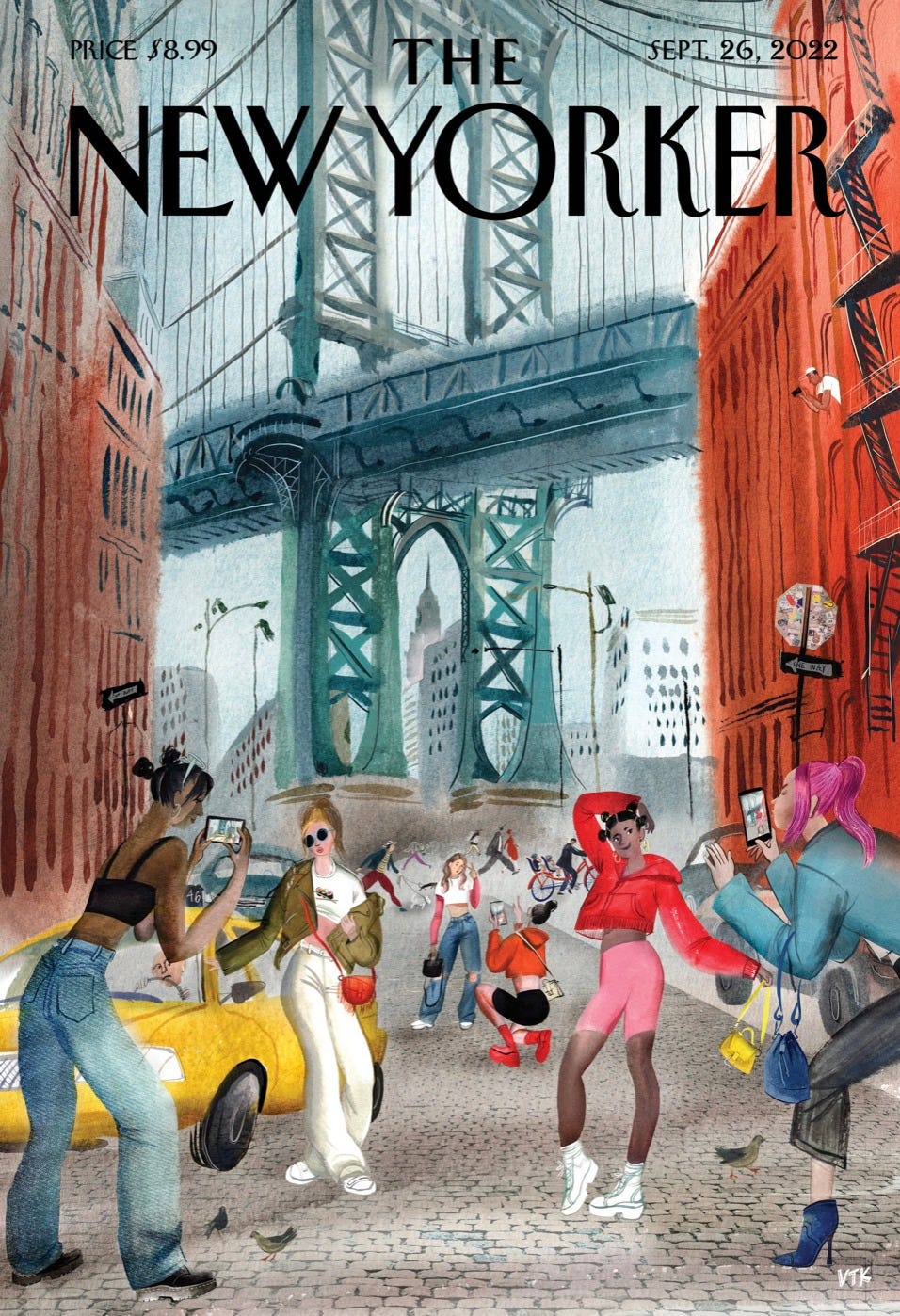
I leave my home, and I enter chaos.
The scene: People literally bumping into each other nonstop, clumps of teenagers crowding in front of doorways, bartenders unloading bottles in the background of wedding pictures, a delivery truck honking through a music video, and a few children screaming out in boredom and photo fatigue.
I live in a very touristy neighborhood. It's like this all the time. (Then it becomes a ghost town around 7pm.)
The neighborhood is called Dumbo, and the advent of Instagram brought a wildfire interest in this stretch of Brooklyn, particularly for this one view:

Photo by Caroline Culler
What was once a sleepy industrial area is now Selfie Town, as depicted on a recent New Yorker cover:

#fallstyle by Victoria Tentler-Krylov
It's been a bit of a culture shock for me, coming from a distinctly non-touristy neighborhood that prides itself on its hyper-local community vibe (the most famous thing about the area is a members-only co-op grocery store).
I'm not yet sure what my new neighborhood is about, since the population changes every day. The tourists don't seem sure what this neighborhood is about either, since they will often dawdle around, disoriented, while I weave through them trying to get to my train.
"Pretend it's a city!" I want to scream; I want to aggressively point to the signs around Dumbo saying "Be respectful: People actually live here!"
I know it's a ridiculous thing to get worked up about. As my friend noted, "Your biggest complaint about where you live is that your street is too photogenic."
But it's the most common collective woe about the neighborhood. Whenever I say where I live, I hear the same response, "I love Dumbo except for all the tourists."
Except for the tourists.
Too many tourists.
Do the tourists get annoying?
I couldn't stand all the tourists.
It's gotten me curious about when and why we all decided that tourists are pesky, a nuisance, something to be avoided. I've clearly fallen into that camp, but why exactly?
On one hand, tourists are wonderful: They bring a vibrant, enthusiastic energy and it's a gift to be around people from all over the world. As I'm writing this in a Dumbo cafe, I'm hearing four different languages as a mother-daughter duo investigates a guidebook and other families joyfully swipe through their photos from earlier in the day. It's raining outside and they've found shelter, and I think about some of my favorite moments from trips abroad when a warm cafe beckons me in from a downpour.
This is as far as I get in relating to them before I remind myself I LIVE HERE, which feels important to my narrative for some reason.
It's an ugly but natural defense that comes up in me often as I walk the blocks around my apartment building, essentially: I belong. You don't.
And yet, the tourists belong as much as I do. Why is it so hard to admit that? Why is there such a mass irritation toward people who just want to visit a particular street?
I have one idea.
It has to do with a topic I've been thinking a lot about as I prepare to write my next book: rats.
We, as a species, one day decided that we hate rats. According to most humans, rats are perfectly acceptable to fear, despise, torture, and kill without a second thought. If you see one, it's reasonable to trap it. If you like them, something is off.
I wonder why this started. It feels rather random to me; we set out food to attract sparrows, but god forbid the rats eat it instead! The only food we deem rats worthy of is the bait that obliterates them.
You could argue that rats spread diseases. Okay, but so do humans. You could say they are ugly, but a lot of endearing animals are objectively strange-looking.
What I think is happening with rats is.... (prepare youself)
They remind us too much of ourselves. We can't handle it.
Rats only live where humans live. They thrive in cities, among crowds and cramped spaces signaling "Here's where the people are." What we call our "garbage" is their life source: they eat what we eat, they love what we love, they seek refuge where we seek refuge.They find homes in our beloved parks, backyards, subway stations and rivers.
Rats are highly intelligent, particularly in their capacity for emotion. Besides humans, rats are the only animal who can feel regret about their actions. They have extraordinarily sensitive ears and appear to enjoy music, demonstrating strong individual preferences for certain genres. They recognize each other and display the same symptoms of grief that we do when a family member dies. Their brains are very similar to ours in makeup, and in many cases their problem-solving abilities have far exceeded our own.
Perhaps a part of us intuitively knows that, and that's why we trap them in boxes that we can't bear to look at. It's too hard to acknowledge that this thing that repulses us is so, so very much like us.
Okay now back to the tourists:
It's very easy to be annoyed with tourists because we can so easily "other" them. They eat at restaurants that we wouldn't be caught dead in. They stand in line for offensively mediocre pizza. They're easily swayed into overspending. They're nothing like us!!!
But...they are exactly like us.
And when we talk to tourists individually, we remember that. There's a winsome man traveling alone with his guide dog, a golden retriever who is bilingual in French and English and is "a little jet-lagged so she's grumpy." There's a couple who are eating pancakes for the first time, and can't stop grinning. There's a young woman who took the wrong express train and ended up an hour from her hotel. We've all been there. I was there a week ago.
Am I irked because all the visitors in my neighborhood remind me of things in myself that are hard to acknowledge: the fact that I never feel a true sense of belonging, that I'm over-eager and over-earnest, the concern that I'm in someone's way at all times?
I believe the things that repel us the most have the opportunity to show us who we really are. See: the resourceful, guileful, social rats that are much more similar to us than our ego-affirming pets. We cannot bring ourselves to love the human-like qualities of city rodents because it would threaten our desire to view them as pests.
And New Yorkers (like me) seem insistent on avoiding tourists, but the alternative is sweeter:
When I give up whatever impulse is compelling me to assert my belonging in a neighborhood I just moved to, I chill out and enjoy. I appreciate hearing ambient Danish. I adore watching people gasp as they finally catch a glimpse of the bridge. I happily give directions (apologies to anyone I've given directions to).
I hope I never grow out of the wonder I feel when I walk along the East River at dusk and my thoughts echo the lyrics of this dreamy ballad about the other New York river.
We're all both guest and host, wanderer and welcomer, and just because someone's taking a selfie on my street doesn't make them any more ridiculous than I am. (Though I hope they think I'm cool when I go into my building.)
Before performances of Hamilton, Lin-Manuel Miranda would remind the cast, "This is someone's first show, and this is someone's last show."
When I'm elbowing my way through the flocks of selfie-ers and matching-shirt tour groups, I remind myself of the same. This is someone's first trip, and this is someone's last trip. Treat them accordingly.



